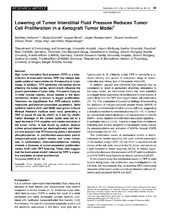Lowering of tumor interstitial fluid pressure reduces tumor cell proliferation in a xenograft tumor model
| dc.contributor.author | Hofmann, Matthias | en_US |
| dc.contributor.author | Guschel, Maike | en_US |
| dc.contributor.author | Bernd, August | en_US |
| dc.contributor.author | Bereiter-Hahn, Jürgen | en_US |
| dc.contributor.author | Kaufmann, Robert | en_US |
| dc.contributor.author | Tandi, Christa | en_US |
| dc.contributor.author | Wiig, Helge | en_US |
| dc.contributor.author | Kippenberger, Stefan | en_US |
| dc.date.accessioned | 2015-04-15T09:32:00Z | |
| dc.date.available | 2015-04-15T09:32:00Z | |
| dc.date.issued | 2006-02 | eng |
| dc.identifier.issn | 1522-8002 | |
| dc.identifier.uri | https://hdl.handle.net/1956/9790 | |
| dc.description.abstract | High tumor interstitial fluid pressure (TIFP) is a characteristic of most solid tumors. TIFP may hamper adequate uptake of macromolecular therapeutics in tumor tissue. In addition, TIFP generates mechanical forces affecting the tumor cortex, which might influence the growth parameters of tumor cells. This seems likely as, in other tissues (namely, blood vessels or the skin), mechanical stretch is known to trigger proliferation. Therefore, we hypothesize that TIFP-induced stretch modulates proliferation-associated parameters. Solid epithelial tumors (A431 and A549) were grown in Naval Medical Research Institute nude mice, generating a TIFP of about 10 mm Hg (A431) or 5 mm Hg (A549). Tumor drainage of the central cystic area led to a rapid decline of TIFP, together with visible relaxation of the tumor cortex. It was found by sodium dodecyl sulfate polyacrylamide gel electrophoresis and Western blot analysis that TIFP lowering yields a decreased phosphorylation of proliferation-associated p44/42 mitogen-activated protein kinase and tumor relaxation. In confirmation, immunohistochemical staining showed a decrease of tumor-associated proliferation marker Ki-67 after TIFP lowering. These data suggest that the mechanical stretch induced by TIFP is a positive modulator of tumor proliferation. | en_US |
| dc.language.iso | eng | eng |
| dc.publisher | Elsevier | eng |
| dc.rights | Attribution-NonCommercial-NoDerivs CC BY-NC-ND | eng |
| dc.rights.uri | http://creativecommons.org/licenses/by-nc-nd/3.0/ | eng |
| dc.subject | Tumor interstitial fluid pressure | eng |
| dc.subject | tumor cell proliferation | eng |
| dc.subject | mechanical stimuli | eng |
| dc.subject | p44/42 MAPK | eng |
| dc.subject | Ki-67 | eng |
| dc.title | Lowering of tumor interstitial fluid pressure reduces tumor cell proliferation in a xenograft tumor model | en_US |
| dc.type | Peer reviewed | |
| dc.type | Journal article | |
| dc.date.updated | 2015-03-31T13:41:09Z | en_US |
| dc.description.version | publishedVersion | en_US |
| dc.rights.holder | Copyright 2006 Neoplasia Press, Inc. | |
| dc.identifier.doi | https://doi.org/10.1593/neo.05469 | |
| dc.identifier.cristin | 377476 | |
| dc.source.journal | Neoplasia | |
| dc.source.40 | 8 | |
| dc.source.14 | 2 | |
| dc.source.pagenumber | 89-95 |

